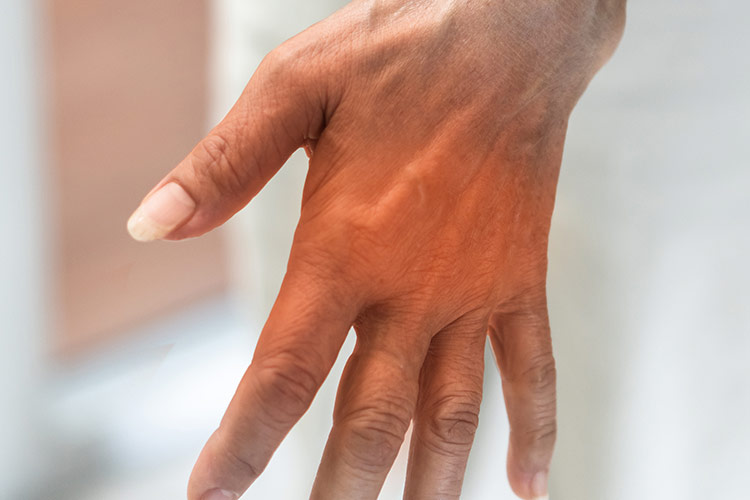Peripheral Neuropathy
Peripheral neuropathy is a disorder in which nerves malfunction. Neuropathy means dysfunction or damage to one or more nerves. Peripheral neuropathy is dysfunction or damage to one or more nerves in the peripheral nervous system, which is the network of nerves beyond the brain and spinal cord.

There are three types of neuropathy:
Mononeuropathy is chronic neuropathy of one nerve or one nerve type.
Multifocal neuropathy affects more than one nerve in a specific area.
Polyneuropathy affects nerves throughout the body.
There are three types of peripheral nerves that are affected by peripheral neuropathy:
Sensory nerves which are nerves that communicate information about the five senses to the brain.
Motor nerves communicate information about contracting and relaxing muscles from the brain to the muscles of the body.
Autonomic nerves control involuntary body functions, like breathing, heart rate, sexual arousal, and sweating.
Symptoms
Symptoms of peripheral neuropathy can be different among patients because of the many types and locations of the condition. A few of the more common symptoms of peripheral neuropathy are:
- Numbness in the hands or feet,
- Tingling (also known as pins and needles), which can sometimes spread from hands and feet to arms and legs,
- And sensitivity to touch.
Peripheral neuropathy can also cause:
- Lack of coordination, which can lead to falls, as well as
- Muscle weakness, and
- Pain that can feel sharp, burning, jabbing, or throbbing.
If the autonomic nerves are affected, possible symptoms include:
- Heat intolerance,
- Excessive sweating, or
- Not being able to sweat,
- Digestive issues, sometimes including diarrhea or constipation, and
- Changes in blood pressure, which can cause lightheadedness or dizziness.
Causes and Risk Factors
There are also a number of risk factors and other conditions which can cause peripheral neuropathy. Risk factors for peripheral neuropathy include
- Being overweight,
- Over the age of 40,
- Having high blood pressure, and
- Diabetes.
A person's genetics are also a risk factor for peripheral neuropathy: peripheral neuropathy is more likely to develop in people who have a family history of the disorder, though it is only one of several risk factors.
Some generalized diseases like diabetes, kidney disorders, hypothyroidism, certain vitamin deficiencies, and diseases that cause chronic inflammation, can cause peripheral neuropathy. Peripheral neuropathy can be caused by viral or bacterial infections, as well as certain autoimmune diseases.
Causes include
- Lyme disease,
- Chickenpox, and
- Rheumatoid arthritis.
- Injury,
- Carpal tunnel syndrome,
- Alcohol and
- Toxins (including glue, solvents, and insecticides), and
- Exposure to heavy metals.

Prevention
There are a few strategies to prevent peripheral neuropathy or prevent it from becoming worse. Avoiding unnecessary procedures, as complications can sometimes include injuries from needles or surgery. Preventing diabetes development or worsening, diabetes is the leading cause of polyneuropathy, the majority of people with diabetes have nerve damage. Stop or moderate alcohol and cigarette use, maintain a healthy diet and regular exercise. Minimize medications that cause neuropathy or worsen neuropathy with the help of your doctor.
The symptoms of peripheral neuropathy vary between patients, so diagnosis can become a complicated process in some cases.
Diagnosis
The process of diagnosis usually includes a medical history, as well as physical and neurological exams. There are a number of tests that can be used to help diagnose peripheral neuropathy, including neurodiagnostic skin biopsy, electromyography, a CT scan, and an MRI of the spine or nerves. If you have questions about your situation, be sure to ask your doctor or healthcare provider.
